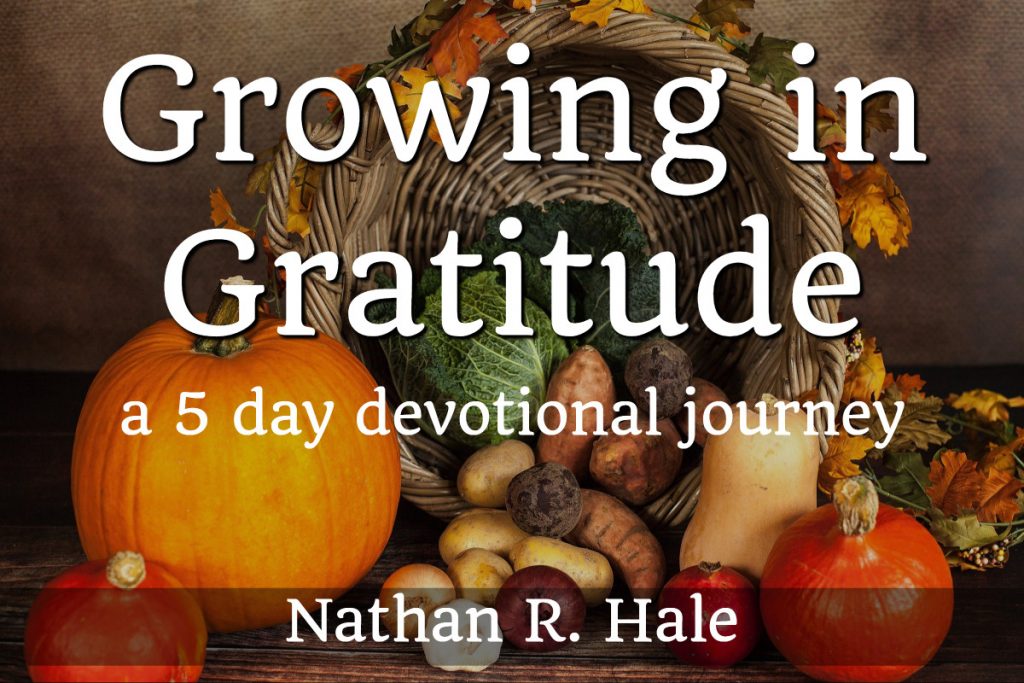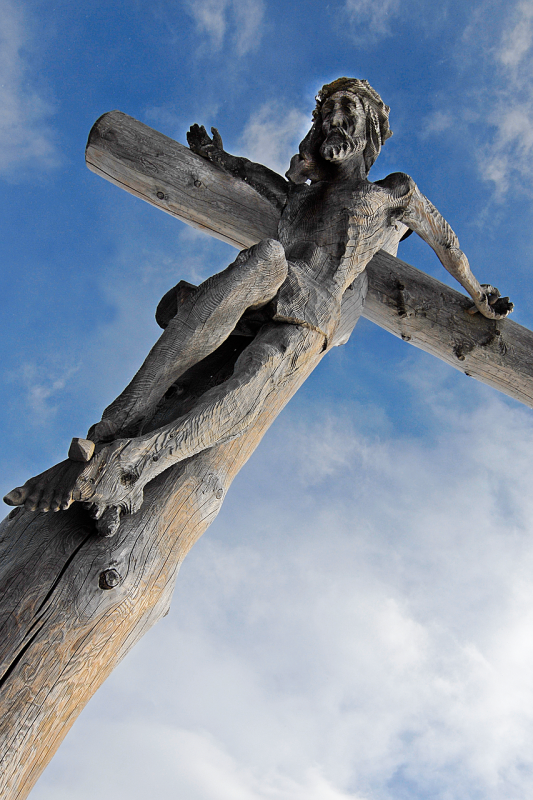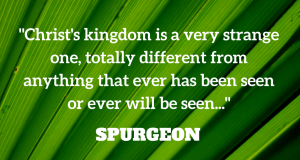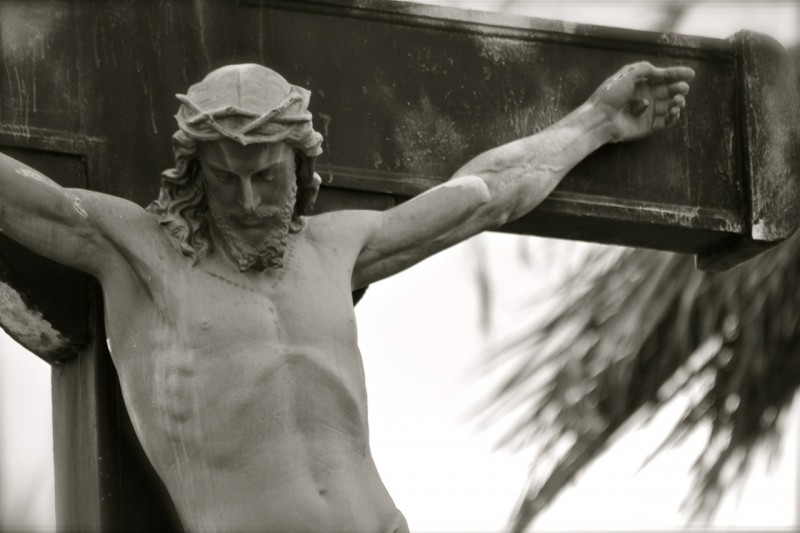-
What I believe about immigration and giving up the right to bear arms, in brief
I am in favor of Christians treating illegal immigrants humanely, hospitably, and fairly (and advocating for the same) as a witness to the future universal Kingdom, imperfectly present now in the Church, where the gates will never be shut at the end of the day (Rev. 21:25)
I am not in favor of the breaking of reasonable, just civil laws without extreme extenuating circumstances.
I am in favor of Christians voluntarily giving up their right to bear arms (and advocating for the same) as a witness to the future universal Kingdom, imperfectly present now in the Church, where swords will be beaten into plowshares (Is. 2:4)
I am not in favor of a blanket condemnation on all forms of self-defense or any penalty (ecclesiastical or civil) toward those that choose not to voluntarily give up their right to self-defense.
-
Christians are weak and lawless
Christians are indeed by definition weak and lawless according to worldly standards.
Our weakness is in loving our enemies and caring for the stranger, even though it’s risky.
Our lawlessness is a rejection of any authority that would seek to usurp the Lordship of Christ who commands us to do those things.
But we are not weak, we only appear that way.
Jesus appeared weak on the cross to many, like a lamb led to the slaughter, but he defeated death there once and for all. This is how God works through Christ, and how he works through us–Christ’s Body on earth (2 Cor. 12:9-11).
And we are not lawless.
Only now we live not by laws grounded in lies and worldly commitments. These always result in suffering and death for others. No, we are empowered to live according to a different kind of law that leads us–through death to ourselves–to life. This is the law of love, which comes from the Spirit (Rom. 8, 13:10)
-
7 observations regarding social media in the present time
 Photo by NordWood Themes on Unsplash
Photo by NordWood Themes on UnsplashSocial media is both more important and less important than we often give it credit for as communications medium.
I submit the following observations for your consideration.
- I have come to realize (along with everyone else by this point) that most platforms are addictive by design, and so some kind of intentional boundaries are necessary.
- Scrolling the FB feed is one way to get a snapshot of what’s going on in the lives and minds of people I care about, but it is a woefully incomplete picture at best, and at worst can be an outright misrepresentation of what’s really going on.
- Scrolling the FB feed is a great way (if I am self aware enough) to expose some of my own anxieties, insecurities, and emotionally-charged issues. It can also result in a lot of temptation to express those things in unhealthy ways that are harmful to myself and others.
- For many (myself included), scrolling the FB feed is spiritually and emotionally draining (even if interesting and enjoyable). This is something that needs to be taken into account since—as an addictive activity—it can quickly drain all or most of your energy.
- The experience of social media and Facebook in particular changes dramatically if you look for opportunities to express kindness and gratitude.
- The way disagreement is often handled on social media is disappointing. If I find myself too discouraged by this it’s time for me to take a break. The only way to change this culture is to model a better way and refuse to be drawn in by personal attacks and other less than civil ways of communicating. We must insist on real discussion. This, however takes emotional, mental, and spiritual energy, so I have to make sure FB is the appropriate place to spend that energy in the moment.
- FB can be fun and worthwhile in small doses, but my greatest vocational impact will not be made there so long as my primary ministry after tending to my family is in a local church. My greatest impact will be made via direct communications and in-person presence with my parishioners, not through a passive broadcast (no matter how well written, provocative, or pastoral) so I have to think about my boundaries, habits, and energy accordingly.
-
My GTD system, June 2018
- Capturing
- On the go: Emailing my Trello inbox via my iPhone
- In meetings: Pen & paper
- On the web: Trello extension for Chrome
- Clarifying
- GTD workflow
- Organizing ideas and next actions in a useful way
- Trello
- OneNote
- Google Calendar
- Microsoft OneDrive (current/work files)
- Google Drive (Personal archive)
- Physical file cabinets at home and office
- Reflecting
- Weekly review checklists
Previous tools and techniques
- Capture: Field Notes + Pilot G2 Mechanical Pencil (full write up)
- List management: Trello (full write up)
- Calendar: Google Calendar
- Email: Archive + Trello
- Physical Tickler
- Files: Dropbox (church), Google Drive (personal), OneNote (research), Physical file cabinet (1 personal + 1 work)
- Capturing
-
The essential books
This is a “living post” and will be updated over time. You’ll find a curated list of books here that have proven themselves life-changing and helpful over time.
- How to be filled with the Holy Spirit by A. W. Tozer. A deeply biblical yet accessible work that avoids much of the popular hype surrounding the charismatic gifts, while embracing fully the person and work of the God the Holy Spirit.
- The Celebration of Discipline by Richard Foster. A definitive work on spiritual growth and the spiritual disciplines.
- The Meaning of Marriage by Tim Keller. Probably the best overall book on marriage from Christian perspective out there. Read my full review.
- Mere Christianity by C.S. Lewis. Where you want to start if you're questioning Christianity on any level.
- Worship Old & New by Robert Weber. Academic, but important for understanding the meaning and development of Christian worship over time.
- My Utmost for His Highest by Oswald Chambers. Undoubtedly one of the most profound devotional works of all time.
-
Growing in gratitude
 This 5-day, Bible-based devotional ebook is designed to help you:
This 5-day, Bible-based devotional ebook is designed to help you:- Learn how to live a life infused with joy
- Enjoy living in authentic community
- Discover St. Paul's "secret" to contentment
- Experience the presence of God
- Understand your greatest calling in life
This is the perfect devotional tool to prepare for and celebrate Thanksgiving!
Purchase
-
Meditation made simple
 Learn Christian meditation in 15 minutes or less per day for 21 days, and make it a life-giving habit that lasts.
Learn Christian meditation in 15 minutes or less per day for 21 days, and make it a life-giving habit that lasts.We live, in fact, in a world starved for solitude, silence, and private: and therefore starved for meditation and true friendship. - C. S. Lewis
Learn to to become silent, to be still, to practice solitude. Learn to become truly self-aware. Learn to listen to God. Experience joy and peace and community that lasts.Open your entire being to the work of God the Holy Spirit, and be changed by the Truth of God’s Word.
Learn Christian meditation in 15 minutes or less per day for 21 days.
Christian meditation isn’t magic, but it is mysterious. Some of the mystery will never be fully unlocked for us, but what stumps most people are accessible basics…discovering what Christian meditation is, how it can help you grow closer to God, and how to stay consistent over time.
In this email course, I’ll teach you everything you need to know to get started on a journey that can bring you closer to God than ever before.
This e-course is delivered to you via email, one lesson per day for twenty one days.
Each email includes beautiful art, quotes from brilliant spiritual writers, journal prompts/questions for reflection, and solid, practical content from me to learn Christian meditation.
Key topics covered:
- The one benefit of meditation that's so much better than calm, inner peace, etc--but that so many people miss!
- The often-overlooked Biblical foundations for Christian meditation
- What Christian meditation really is--and what it is not.
- 3 surprising experiences you can expect from Christian mediation
- The single best technique for beginners to start practicing Christian meditation
- The secret to keep going even when you fail
- A proven strategy to keep you consistent in your practice over the long haul
Purchase
Zero Risk, 100% Satisfaction Guarantee If for any reason you are not 100% satisfied, I'll issue you a full refund up to 30 days after your purchase. That means you could go through the entire course and if it's not helpful to you, I'll give your money back. That simple. -
Super-quick sermon prep
 Finish your sermon or Bible study in half the time.
Finish your sermon or Bible study in half the time.Are you a busy pastor, small-group leader, or Bible-teacher that struggles to get your sermon or Bible studies done in a reasonable amount of time? Do you sit down to study without a clear plan and struggle to find your next step?
I’ve done the bi-vocational thing and I’ve got three kids, so I know firsthand how difficult it can be to create quality messages and talks when you’ve got other ministry commitments, a family, and maybe even a day job taking up a lot of your time.
Over the years, I’ve refined a process for researching and developing Bible-based content that is simple and reproducible. With a little tweaking, it will save you a lot of time and effort on sermon and Bible study prep.
This step-by-step guide will give you a set of tools to make sure you know exactly what to do next as you develop Bible-based content, and will help you get consistent, thorough results–all with less time and way less stress than before.
What people are saying…
Oh, my word, a guide to Trello? That's exactly what I've been needing!...I can see how much this would help me with any kind of workflow.
- Angie H.
...a great digital tool... clean and straight forward. - Jason H.
What you'll get You'll get a short, 4-page PDF report outlining key principles and detailing the most important tools I use, along with an extensive step-by-step template and checklists for Bible research and sermon writing.Purchase
-
Beginning with the Common English Bible
I started reading through the Common English Bible today.
This is a controversial translation, to be sure (well, two or three verses, anyways). Sponsored by mainline Protestants but taking advice from both evangelicals and Roman Catholics, it aims to be a truly ecumenical translation.
This is part of the attraction for me, even though there are SO MANY English translations out there; all of them good. Nevertheless, I dig the ecumenical vibes and I appreciate the boldness of the translation while simultaneously missing the familiar English idioms that carry over from the KJV to ESV.
God willing I’ll read the whole thing this year.
-
Skye Jethani's IMMEASURABLE is a book I’d like to give every person just starting out in ministry
I’m very grateful to be part of the launch team for Skye Jethani’s brand new book Immeasurable: Reflections on the Soul of Ministry in the Age of Church, Inc. As part of the launch team, I got this book for free in exchange for a fair review. I signed up on a whim; but I’m really glad I did.
Immeasurable is a book I’d like to give every person just starting out in ministry.
It is a much-needed antidote to the consumer-driven, success-by-the-numbers approach of a lot (if not most) of what passes as “Church leadership training” these days.
Skye does a great job of distilling and applying some of the best ideas of the “giants” he thanks at the beginning of the book—guys like Eugene Peterson, Dallas Willard, Brennan Manning, and Henri Nouwin.
If young pastors and new leaders start here, they’ll be on a virtual launch pad to much of the best literature out there on the essence of pastoral ministry, and they’ll be exposed to ideas and stories and will likely challenge them deeply.
Skye casts a deeply inspiring vision of pastoral ministry that encouraged me think about “church growth” as something much deeper than attendance numbers or even theological education. Instead, Skye urges pastors and leaders to consider growth in terms of communion with Christ and empowerment of the laity to deeply pursue their own spiritual growth.
According to Skye, Christian ministry must never be fully equated with mission, as vital as that is, but rather must retain real relationship with God as the ultimate end. This is so easily lost today when—as he reminds us—so many good things (like people in the pews and a passion for God’s mission in the world) become ultimate things.
This book is nothing less than a guide on how to avoid the ever-present temptations of idolatry for ministers. Above all, Immeasurable reminds us that ministry can never be about control; like all of life, it must be about communion.
A note on format of the book: it’s divided into 24 chapter that can each be read in about 20 minutes or less. Each chapter is more-or-less a self-contained essay on a different topic, ranging from the role of ambition in ministry, to preaching, to simplicity, to building influence and beyond. Each chapter has a few questions for reflection at the end. This format lends itself to serious reading and thought, and would be great to go through slowly with leadership teams. I could also see this being used for training programs for new leaders, with the questions being jump-off points for discussion with mentors.
Highly recommended.
-
Video Review: Premium Value Holy Bible Large Print NLT
-
5 powerful ways to leverage Trello for church
Trello, the digital Kanban and project management software, is all the rage for personal productivity and collaborative project management. Its simple and intuitive interface combined with clever features and powerful integrations with other services have rightly caused it to ascend to the upper echelon of similar tools. The more I use Trello for church, the more excited I get about the possibilities.
If you've never checked out Trello, now's the time. Before you go on with these tips, you might want to read my brief primer.Here’s how you can leverage the power the Trello for church:
1) Collaborative task management. I’ve set up a simple shared board between me (the rector of my church) and my administrative assistant with the following lists:
- Todo
- Doing
- Done
- Resources
The Resources list has links to some of the other systems we use and attachments for quick reference.
2) Leadership onboarding. I am in the process of working through exactly what this should look like for us, but you can easily put together a Trello board with essential information for new leaders. Possible lists could be:
- Team/Staff - with a card/photo for each person on staff
- HR Docs
- Policies
- Church docs - constitution, bylaws, etc.
4) Worship set planning. Worship leaders can make a Trello board with a list for each Sunday and card for each song. Drag and drop makes it easy move stuff around as needed in the set, and you can also attach chord sheets, etc to the cards for band members or other leaders.
5) Sermon series planning. Create a board for your series with lists for each week/sermon/talk, and add cards for things like:
- Preacher
- Main passage
- Theme
- Title
- Song ideas
- Graphics
The flexibility and power of using Trello for church means that you’re only limited by your own creativity when it comes to streamlining your church’s processes and communication.
The best part about using Trello for church?
You can do everything I’ve outlined above absolutely free. Upgrading will get you a some extra perks when it comes to backgrounds and integrations, but it’s not at all necessary to get started with this amazing tool for ministry.
Did I mention their mobile apps are free and awesome, too? You’ll have all this stuff at your fingertips when on the go.
I hope this post has been helpful in giving you some ideas on how to use Trello to level up your planning, organization, and collaboration in your own church context.
-
The Timbuk2 Rogue Laptop Backpack for travel & every day carry
I like backpacks. It’s a weakness. I can often obsess over finding the perfect pack, and I own way more than I really need. Moreover, I gravitate toward the expensive ones.
A little over a year ago I gave away two other daily carry type backpacks. Short on cash, but needing a way to haul gear around town during the day and around the country on short trips, I reluctantly started looking for something cheap.
I saw the Timbuk2 Rogue Laptop Backpack on sale for $35 [edit: correction: $29], so I thought, why not take a chance…it’ll just hold me over until I get a better pack. Then I stashed it away and switched to small messenger bag (too small for my laptop). When I started having to carry around my laptop, I sold my messenger and I got the Rogue out of the closet.
A year later, it’s still my daily driver.
1) Design. Sometimes, simpler is better. This is one of those times.
The Rogue is top-loading pack with one main compartment and 3 additional pockets.
The large main compartment is big enough to pack everything you need for the day with enough room to throw in some library books or a small sack of groceries later; it’s about 25 liters. The top flap is thoughtfully designed to keep water out via sides that tuck under (kind of hard to explain…) and fastens with a combination of velcro and sturdy buckles. This style of opening allows for the bag to expand and contract a bit as needed (like a true rolltop, but less so) and provides a handy way to stow a light jacket under the straps.
Inside the main compartment you’ll find a lightly padded laptop sleeve, a small zippered pocket toward the top along with an admin section for your writing utensils, business cards, etc.
On the exterior of the pack there’s a nice small zippered pocket for quick access to cables, a small tablet or paperback. On one side there’s mesh water bottle holder that can hold most anything up to a liter in volume.
The shoulder straps have the perfect amount of padding: enough to keep you comfortable with loads under 20lbs or so (hopefully you’re not carrying much more than that on the daily) but not so much as to be bulky. There’s fairly useless bottle-opener attached one shoulder strap. I’ve only used it once, but I suppose it could come in handy in a pinch.
A simple webbing grab-handled is sewn to the top above the shoulder straps. Additional understated webbing on the front and side of the pack provide a place to lash on extra cargo, wet shoes, or whatever as needed.
2) Construction. This is my second Timbuk2 bag, and just like my other one it seems flawlessly constructed. There's not a stitch out of place and all the materials seem high-quality and durable. I've had the pack over a year and carried it daily for almost 10 months. It still looks almost new.3) Price. These are often on sale at Amazon, Newegg, etc for $75 and under. Like me, you could get even get lucky and find one under $50 if you’re not too picky about the color. I think this is probably one of the best values in backpacks out there, to be honest.
4) Other general awesomeness. Because of the way this pack is made, it looks great either full or empty. It collapses down nicely when not packed to the brim, so you won’t feel too weird when you’ve just your laptop and jacket. Even when packed full (and this pack can hold a lot!) it maintains a slim profile.
Speaking of looks, I like that it retains pretty much all the function of most tacticool packs, while still maintaining a slightly more sophisticated style. No, it’s not boardroom ready, but neither does it look like you’re heading out to hike the Grand Canyon. There’s nice velcro strip you can put patches on, if you like. I put an Arizona state flag patch on mine.
It’s also a highly water-resistant pack. Top and front are basically waterproof material. The sides might let a little in if soaked, but if you find yourself caught in the rain your stuff should be fine for while you find shelter.
Possible drawbacks
1) The velcro opening is a bit noisy. not at all an issue for me, but I could see how it could be annoying for some people. You could get silencers, if you wanted, and just use the buckles to close the pack.
2) It’s narrow pack. Some wider binders might not fit super well. I have one that I carry all the time and it has to go in diagonally. Standard letter size notebooks and file folders are fine.
3) The laptop sleeve is integrated into main compartment. When traveling, you’ll have to open the main section to get your laptop out when going through security. If you’ve packed it pretty full, it can be tough to get wiggle your laptop back in. For this reason only it’s not my preferred travel pack if I’ve got a laptop, but it’s not horrible or anything.
This pack isn’t quite big enough for trips longer than a couple nights, and it’s not the most TSA friendly design. All that said…After nearly a year carrying this bag every day, I’ve no immediate plans to replace it. If this one got lost I might even get another in a different color. It’s just a great all-around daily pack.

Being forced to work with a less expensive pack has helped me realize that more expensive doesn’t always equal better. More than that, sometimes the best pack is the pack you already have. And even more than that, my life hasn’t change significantly since “downgrading” to less expensive daily carry bag. All good lessons for a gear junkie like me.
Buy on Amazon
(unfortunately, I notice it's no longer available 😢) -
How I'm Getting Things Done with Field Notes
 Field Notes are the clever, collectible (and thus, a bit addictive), design-focused notebooks that all the bloggers rave about. They really are fun, fairly affordable, and quite useful.
Field Notes are the clever, collectible (and thus, a bit addictive), design-focused notebooks that all the bloggers rave about. They really are fun, fairly affordable, and quite useful.I use my Field Notes as my pocket notebook. It goes where I go to capture thoughts and ideas while out-and-about. I also use them to plan out my day.
When I’m disciplined, it goes like this:
- At night, I'll prepare the page for the next day by writing the day of the week, month, date, and liturgical feast if applicable at the top of the page.
- Right below that I will write down the readings for Morning and Evening Prayer for the Daily Office.
- On the left side of the page, I will list the most important things I'd like to get done for the day (no more than six usually). As the day goes on I just capture item below that to make a running list.
- On the right side of the page I've started making a simple daily agenda from 9-5 with any hard commitments I've made so I can see my day at a glance and add to it as necessary.
I use a Pilot G2 .07 mechanical pencil to write in my FN, which I love, because the metal tip retracts when not in use, making this a pocket-friendly pencil.
If you want, you can get tons of nice covers for your Field Notes, but they’re fine without, as long as you are okay with your notebook developing some character. I like having a bit of extra protection for my notes, so I had a cover custom made from this Etsy shop.
-
How I'm Getting Things Done with Trello
For context, you’ll want to read Say hello to Trello, a new tool to organize your life and ministry
I have a “team” in Trello called Trusted System. Within that team I have six boards:
- Next
- Projects
- Tickler
- Someday/Maybe
- Reference Lists
- Horizons & Areas of Focus
Next
My Next board has four lists of cards:
- Inbox - for throwing stuff in as go throughout my day
- Waiting for - anything that needs to get done ASAP but I'm still waiting on someone else's action (reply to an email, etc)
- Next - Stand alone physical next actions ( for example "move bookshelf from living room to hall nook")
- Agendas - One card containing a list of things to talk about, per person need. There's always agenda cards for my wife, bishop, associate pastor, administrative assistant, plus a few others as needed.
I use Trello color-coded “labels” for contexts. My contexts are:
- Home
- DMAC (the church I pastor)
- Read
- Phone
- Errands
- Anywhere
- Laptop
Projects
My Projects board contains anything that that requires more than one physical next action. As I review this board every week, I add physical next actions to my next board. I have two lists on this one:
- Current - Projects that are active
- Pending/Delegated - Similar to "Waiting for" on my Next board.
Reference Lists
This is a pretty flexible board that just contains any lists I need on regular basis for reference. Mostly just packing lists as this point.
Someday Maybe
My Someday Maybe board has six boards, each with stuff I’d like to do eventually, but are not at all pressing. As I review this I move these things to the appropriate places on my Projects or Next boards. My lists are:
- Personal Projects
- DMAC (the church I pastor)
- Writing
- Stuff to buy
- Home & Family
Tickler
This functions as a complement to my physical tickler file and my digital calendar. It is made of four lists:
- January - March
- April - June
- July - September
- October - December
As I go through the year I drag the current quarter to the left so it’s always the first one I see. I use this to put date-specific reminders, files/confirmation numbers I’ll need etc. This is for stuff that needs to happen around a certain date/month, but is not set in stone. So “schedule eye exam - January” I’ll just throw in January-March. When I review this board, I’ll move stuff to the appropriate place as needed: Projects, Next, or my calendar.
Horizons & Areas of Focus
This board is made up five lists. The first list is Mission and Core Values. The first card contains my personal mission statement:
“Help others discover and grow in the great love of God.”
Below that I have a card for each of my core values:
- Spirituality
- Family
- Fellowship
- Fun
- Service
- Stewardship
- Creativity
- Rest
In each of those cards I have a list of core habits I try to cultivate. So in the “Stewardship” card I have:
- Spend less than I make
- Exercise at least 3 times per week
- Review calendar weekly
The other lists are “areas of focus” or “spheres of life.”
- Husband
- Father
- Parish Priest
- Musician
Each of those lists has four cards:
- Desires - Specific ideas of what I want to be like in these areas
- Actions - Concrete ways to move toward the vision (no more than 3 at a time)
- Challenges - Thinking ahead to possible obstacles
- Vision - A description of the big-picture "end result" in each of these areas
-
If you'd like humility, try praying for it.
God gives grace to the humble. Are you developing the virtue of humility?
This old Christian prayer–in a form of repeated petitions called a litany–has challenged many, including me. I believe if you pray these things honestly, God will grant your request in his time. It is especially appropriate for the Lenten season; it is combined here with a prayer from my own Anglican tradition.
The Litany of Humility
O Jesus, meek and humble of heart, Jesus, hear me.
From the desire of being esteemed, Deliver me, Jesus.
From the desire of being loved, Deliver me, Jesus.
From the desire of being sought, Deliver me, Jesus.
From the desire of being honored, Deliver me, Jesus.
From the desire of being praised, Deliver me, Jesus.
From the desire of being preferred, Deliver me, Jesus.
From the desire of being consulted, Deliver me, Jesus.
From the desire of being approved, Deliver me, Jesus.
From the desire of being considered, Deliver me, Jesus.
From the fear of being humbled, Deliver me, Jesus.
From the fear of being despised, Deliver me, Jesus.
From the fear of being rebuffed, Deliver me, Jesus.
From the fear of being slandered, Deliver me, Jesus.
From the fear of being forgotten, Deliver me, Jesus.
From the fear of being ridiculed, Deliver me, Jesus.
From the fear of being wronged, Deliver me, Jesus.
From the fear of being suspected, Deliver me, Jesus.
* * *
That others may be loved more than I, Jesus, grant me the grace to desire it.
That others may be esteemed more than I, Jesus, grant me the grace to desire it.
That others may grow in the opinion of the world and I diminish, Jesus, grant me the grace to desire it.
That others may be employed and I set aside, Jesus, grant me the grace to desire it.
That others may be praised and I forgotten, Jesus, grant me the grace to desire it.
That others may be preferred before me in everything, Jesus, grant me the grace to desire it.
That others may be more holy than I, provided I am as holy as I can be, Jesus, grant me the grace to desire it.
* * *
Almighty and everliving God, in your tender love for the human race you sent your Son our Savior Jesus Christ to take upon him our nature, and to suffer death upon the cross, giving us the example of his great humility: Mercifully grant that we may walk in the way of his suffering, and also share in his resurrection; through Jesus Christ our Lord, who lives and reigns with you and the Holy Spirit, one God, for ever and ever. Amen.
-
Why I observe Lent
I had been in an emotional and spiritual struggle for years, processing how the Body of Christ could be so defined, so marked, by division, quarrels, and willful ignorance of each other. My spiritual journey had led me right into the middle of some of those painful internal wars, and I hadn’t escaped without getting hurt.
My wounds weren’t gaping open, but they were profound. I left them largely untreated because they were–at first–easy to ignore. They became infected with a certain amount of bitterness, anger, and cynicism, almost without me being aware of it.
Something happened to me, however, on Ash Wednesday of 2011. Baptists, Anglicans, Pentecostals, Non-Denoms all gathered together. I saw the auditorium filled with Christians with deep disagreements over theology and practice nevertheless admitting to one another their deep need for a savior, their total moral, emotional, intellectual, spiritual bankruptcy apart from the Cross of Christ and the promise of his Resurrection.
For a brief 2 hours, I saw the Church, not in perfect unity, yet nevertheless walking together toward Jesus. For the first time in a long time I thought she looked like the Bride of Christ. Hope sparked.
As we received Communion it was as if that spark turned into a roaring fire, and I found my hardened heart couldn’t stand it. Just like that, the bitterness, anger, and cynicism melted away and–in a word–I was healed of my old injuries.
I had hope once again that Jesus will in the power of the Holy Spirit make his Church what she is meant to be.
To me, this is the power of Ash Wednesday and Lent: making space to remember that at the end of the day, all our hope is in Christ, and we will never hope in vain.
-
How to win spiritual battles
In Paul’s ending to his letter to the Ephesians, he talks about how to defeat the powers of evil and darkness. We have take up the whole armor of God.
We have to take it up. Surely the armor of God is a gift, and we would have any of it without God, but Paul says we have to take some initiative. We have appropriate it, practice it, put in on. We have to make the choices to accept the gifts of protection that God has given. And it’s no coincidence that the metaphor here is a full set of armor, each piece designed to work with the others. Each item is crucial, and with out even one, the whole solider would be compromised. That’s why he says take up the whole armor.
So what is the whole armor of God? Let’s survey these briefly in the order they appear:
1) The belt of truth.
This is what holds everything together. In the times of Paul the basic garment was a flowing tunic; it was a square piece of fabric with holes for the head and arms that would hang loosely around the body. When preparing for a fight, soldier would put on the belt, which would gather the material between their legs so they had greater freedom of movement and keep it from being so loose as to be a liability.
This is what the the truth of God’s word does for us. Our faith is founded on the truth that Jesus really did live, that he did really did die, that he really did rise from the grave, and that he really is God in the flesh! This is the truth that keeps everything from unraveling around us. If we don’t have a firm foundation in this truth, we are on shaky ground indeed.
And further, we must people that are about truthfulness, that is we continually seek after the truth, we speak the truth, we believe that truth exists, and we love the truth.
2) The breastplate of righteousness
This is referring the not only to the righteous of Christ that is imputed to us–that is, given to us on his behalf–but also the righteousness of our everyday life. We guard our hearts and innermost being when we live in a way that is holy and pleasing to God. All those little habits of turning your thoughts toward Jesus, of living generously and simply, and so on, will protect you from temptation and subtle lies from Satan.
3) Shoes of the Gospel of Peace.
Without the right footwear for the activity at hand you’re sunk. The right shoes allow to traverse difficult ground quickly and gracefully. A couple years ago I ran a 12 mile obstacle race called the tough mudder. About 6 miles in I realized I had worn the wrong shoes… they were letting rocks in in every mud pit. And there were a lot of mud pits. By the end of the race I could barely walk, let alone run. I didn’t have the right shoes. We sometimes forget that the Gospel is a message of peace and reconciliation, and so we forget the core of our mission. Certainly not everyone will accept or believe the Gospel, but isn’t completely different when we approach people as ambassadors of peace and instead simply trying to assert the fact that we are right and others are wrong? Hateful groups like Westboro Baptist Church show that you can get many facts of the Gospel right, and still miss the core Gospel message.
4) The shield of faith.
Paul says we take up the shield of faith to protect from the fiery darts of the evil one. These darts are actually arrows that were used in the ancient world, dipped in pitch and ignited before launching at enemies. They could be devastating because they would splatter when he hit, lighting all kinds of things and people on fire.
I think of these assaults on our faith as things like inexplicable suffering of loved ones, the stresses of unexpected financial struggles, personal failures, chronic illness. These things have the potential to do us great harm, to shake us to our core. Yet, these are the very moments when we must stand strong in our faith, in our trust that that God that has already won the war by raising Jesus from the dead, thereby conquering death, and will not abandon us in our battle.
5) The helmet of salvation.
This is where it starts getting really good, brothers and sisters. The helmet, the part of the armor that covers the most important part of the body, is called the helmet of salvation. As long as we have put this on by believing in Jesus and confession him as Lord, we know that we will be saved. Not just from our past sin, but from our present struggles, and future failures.
Our ultimate end can’t be anything other than victory. Not because of us, of course, but because Jesus is already victorious. Let me put it another way…the helmet of salvation assures that ultimately, we are invincible to Satan’s attacks. He can’t do anything to snatch us from our Father’s hands.
6) The sword of the Spirit.
Our only offensive weapon here is the sword of the Spirit, which Paul is the word of God. Of course we immediately think of the Bible–“living and active, sharper than any two-edged sword” as it says in Hebrews. And this word is animated by the Spirit. So we must be careful to listen for what the Spirit actually saying to us in the text, being careful to not just assume it’s saying what we might like it say. The image here is of a short weapon that required skill and precision to use. So part of arming ourselves with this weapon is knowing when and how to use it. Jesus used it to counter temptation and lies of the devil, but remember the devil tried to use it too! So we’ve got to be careful with one. It is powerful, but we hurt ourselves or others if we don’t treat it very seriously and listen very carefully, and operate in the power of God the Holy Spirit. You can see how each piece is just absolutely essential. If we don’t have the helmet, we’re in danger of eternal death. No sword and we’re left with no offensive options. No shield and not only are vulnerable but other people as well as the effects of those fiery darts spread. But how do we appropriate it? How to do we put it on?
Through prayer.
Matthew Henry said, “Prayer must buckle on all the other parts of our Christian armour.” So we put on the whole armor by coming to God and asking. All the time. By consciously examining ourselves to see where our weaknesses are and taking action to bring those things to the Father in prayer.
We are to pray at all times in the Spirit which simply means with an open and trusting heart to work of Spirit in our lives.
What would your life be like if–having identified your true enemy–you devoted yourself to fighting with weapons that God has given you? What if in times of crises you saw opportunities to live a holy life marked by prayer and constant witness to the Gospel message?
What could your nation be like if Christians, instead of trying to throw money and worldly influence and guns at problems took up the whole armor of God together and took the fight straight to real sources of evil?
-
Who are you fighting?
In Paul’s famous passage in Ephesians 6:10-20 on the armor of God, he makes a big deal about letting us know who we’re really fighting when it comes to the battles of the Christian life.
So who are we up against? This is crucial. You’ve got to know your enemy to be able to fight them effectively. Paul tells us that our struggle is not against flesh and blood (by which he means human beings) but rather “against the rulers, against the authorities, against the cosmic powers of this present darkness, against the spiritual forces of evil in the heavenly places.”
Spiritual forces of evil, people. In other words, the devil and his demons. In our hyper naturalistic culture this kind of language seems pretty strange, but there’s no way to get around what Paul is saying here. If he’s right (and I believe he is), there are forces at work beyond that which is immediately visible to us. This has important implications.
It means that as we look at the world, the things we perceive as our enemies are not in an ultimate sense what we are fighting.
It means that ISIS is not ultimately our enemy. Politicians and presidents are not ultimately our enemies.
These are pawns only of greater, spiritual powers that desire violence and oppression not only for Christians, but for anyone they bring under their influence.
I say this because we give much attention to to the terrorists and the kings of this world, but if we only ever deal with the pawns, solving earthly problems with earthly means we will not make significant headway against the evil powers and principalities of the spiritual realm.
What Paul is saying here is that you have to take the battle past what you can see…and start fighting even the things you can’t see.
Stay tuned for more.
-
That time my mother-in-law demolished me at paintball
A few years ago Amber’s side of the family decided it would be a great idea to get together around Thanksgiving. And at this family get together, it was decided we would play a rousing game of paintball.
If you have ever played paintball you know it’s really is a lot of fun. Here’s the thing though: paintballs hurt! They’re being shot from a gun, usually powered by compressed gas, at a really high velocity! Well it’s not like I’m a pro paintball player or anything so I wore some grubby clothes and dutifully donned the protective eye mask from the facility. Then I went out to do battle with my inlaws. [Let me pause here. Some of you have met my mother in law right? I mean, she’s saint. If you know Kristy, you can’t imagine her hurting a fly, am I right?]
So around midway through the game I pick her as my target. Honestly, I’m thinking this going to be pretty easy. As I approach, however, I make a crucial mistake. I trip and I fall, which reveals my location to my sweet mother in law. While I am still on the ground she takes the opportunity to just unload her weapon on me at close range. I mean she shot me so many times…and since I was on the ground my neck under my mask was completely exposed. So that’s where she shot me, of course.
It hurt. It hurt bad. I learned two lessons that day:
1) Don't underestimate your opponent. 2) Protect yourself as much as you possibly can--take care of those vulnerable spots before they are exploited by the enemy!I think this is what Paul is getting at in his famous passage on the Armor of God in Ephesians 6:10-20. He’s helping us to realize who our real enemy is, and how to make our defense so we’re not caught off guard.
Stay tuned for more in this series on the Armor of God.
-
Become the righteousness of God
This is an edited manuscript of a sermon I preached at Grand Canyon University. Watch the whole thing below, or keep scrolling to read through the content.
Has something ever happened to you that changed your reality to such extent that you became almost a different person? I can think of a few examples in my own life. When I got married, for instance, my reality changed!
I went from single, to married. From being a bachelor to being a married man. This changed so much about how I lived my life. Every decision was different and suddenly my priorities shifted. It was a very similar experience to become a parent for the the first time.
Maybe you’ve experienced something like this before, either getting married or having kids or a big move or even a new job or career shift. Something happened, that changed your decision making process and set you on a new path. Sometimes these are positive experiences, and sometimes they are negative experiences, but they happen to all of us, and it’s what makes life interesting!
Those of you that know me a little bit know that I’m kind of a nerd. I love super hero stories. Batman, Spiderman, Avengers, all that stuff. An unassuming individual unexpectedly gains knowledge or power or some sick kung-fu skills, they take on this new identity, and then they go and fight crime in while wearing tights and throwing out witty one liners. What’s not to love, am I right? There’s this pattern that’s the same in every single comic book or superhero movie: new reality, a powerful origin story, and a mission to save the world.

I want you to see that this stuff isn’t just pretend movie magic. Like we just talked about, our everyday lives are filled with change and transformation, and the Apostle Paul is tells us you and I are in fact part of the most epic story ever told! And here’s the thing: it’s a true story.
For the love of Christ controls us, because we have concluded this: that one has died for all, therefore all have died; and he died for all, that those who live might no longer live for themselves but for him who for their sake died and was raised.
From now on, therefore, we regard no one according to the flesh. Even though we once regarded Christ according to the flesh, we regard him thus no longer. Therefore, if anyone is in Christ, he is a new creation. The old has passed away; behold, the new has come. All this is from God, who through Christ reconciled us to himself and gave us the ministry of reconciliation; that is, in Christ God was reconciling the world to himself, not counting their trespasses against them, and entrusting to us the message of reconciliation. Therefore, we are ambassadors for Christ, God making his appeal through us. We implore you on behalf of Christ, be reconciled to God. For our sake he made him to be sin who knew no sin, so that in him we might become the righteousness of God.
(2 Corinthians 5:14-21 ESV)
The new reality
Paul set us up with a new reality.
...one has died for all, therefore all have died; and he died for all, that those who live might no longer live for themselves but for him who for their sake died and was raised.
(2 Corinthians 5:14-15 ESV)
This is the event that changed everything for everyone in whole world! One perfect person, Jesus Christ, died and was raised back to life for everyone so that they could be free from selfishness and find real abundant life outside of themselves. This is new reality, and implication are huge, because it means that real self-giving love and authentic community are actually possible. It changes the way we look at everything.
From now on, therefore, we regard no one according to the flesh. Even though we once regarded Christ according to the flesh, we regard him thus no longer.
(2 Corinthians 5:16 ESV)
Once you realize what Jesus has done for you and everyone else, you can’t just look at him from merely human point of view. You can’t just say he was a good teacher or prophet or healer. If you believe what Paul is saying here, that Jesus took your sin with him to the cross, conquered, and came back to life. you can’t look at him the same. He becomes your Lord and your God. And you can’t look at others the same either. You can’t look at yourself the same. This is a new reality that leads to the origin of a new identity.

The origin
Therefore, if anyone is in Christ, he is a new creation. The old has passed away; behold, the new has come.
(2 Corinthians 5:17 ESV)
What does it mean to be “in Christ?” It means to believe in him, and to obey his commandment to love one another. In John 15 Jesus said,
Abide in me, and I in you. ...As the Father has loved me, so have I loved you...Abide in my love. If you keep my commandments, you will abide in my love, just as I have kept my Father's commandments and abide in his love...This is my commandment, that you love one another as I have loved you.
(John 15:4-12 ESV)
When you really believe in Jesus, things change. You begin to love other people in ways you couldn’t before, and it becomes so clear that you have a new identity in him. John Wesley said that for the person that has trusted in Christ, there is
“present, visible, undeniable change! All things are become new - He has new life, new senses, new faculties, new affections, new appetites, new ideas and conceptions. His whole tenor of action and conversation is new, and he lives, as it were, in a new world.”
Do you realize that old you, the one that was a slave to selfish desires, was nailed to the cross with Jesus and is even now dying away? “Behold!” Paul says. Open your eyes and see what Jesus as done and see the freedom that you have been given, and realize that you have been remade on the inside.
Paul keeps going in verse 18, “All this is from God.” This means that this new origin and identity that you have is a gift. There’s nothing you could do earn it or deserve it, because the kind of shift in reality that is required for it can only come from God. Who else can bring someone back from the dead, except the God that created life?
 To go back to superheroes for a minute: You’re not like Ironman in this story. He gets his powers from this suit that he built with his own money and and his own intelligence. You’re more like Spiderman or Superman, who through no effort of their own, are given a gifts of power, and with it responsibility.
To go back to superheroes for a minute: You’re not like Ironman in this story. He gets his powers from this suit that he built with his own money and and his own intelligence. You’re more like Spiderman or Superman, who through no effort of their own, are given a gifts of power, and with it responsibility.The mission
If you wake up to the reality of the love of Christ and what he accomplished for you by dying on the Cross and being raised back to life, if you accept this new identity as a new creation, living for Jesus instead of yourself, then you have a mission. If you’ve ever wondered about your purpose in life, this is it:
...Christ reconciled us to himself and gave us the ministry of reconciliation...Therefore, we are ambassadors for Christ, God making his appeal through us...
(2 Corinthians 5:18-20 ESV)
God wants to get his message out through you and through me. An ambassador speaks on behalf of and with the authority of the person they represent. Can you believe God has given all of us such an important role? To speak for him, in his name, to the world? This is the message we’re to proclaim and to live out:
...on behalf of Christ, be reconciled to God. For our sake he made him to be sin who knew no sin, so that in him we might become the righteousness of God.
(2 Corinthians 5:20-21 ESV)
 Look, I don’t presume to know where you are in your relationship with God today, so let me try to live this out right now.
Look, I don’t presume to know where you are in your relationship with God today, so let me try to live this out right now.If you only hear one thing from me to today, hear this:
Jesus is speaking to you. Right here, right now. And he is saying “be reconciled to God.”
Be reconciled to God, because he made you and loves you. Be reconciled so that you can begin to make sense of both the deep brokenness and the profound beauty of this world.
Be reconciled because what I am saying about Jesus is not only a beautiful story, it is the truth.
Be reconciled to God so that you can receive forgiveness for your sins.
The whole needing forgiveness thing is hang up for a lot of people, and I get it.
Why you need forgiveness from God, and especially why do you need to ask for it, if God is so great? And after all you’re probably a pretty good person.
You know according to your standards and my standards you probably are a pretty good person, but you know you’ve done things that are wrong. You know that your own selfishness has sometimes hurt others, caused you to move farther away from God instead of closer to him. We all know that in relationships, lots of little things add up after awhile.
Every time you have lied or cheated or passed by someone in need or allowed selfish thoughts to run free in your head you have damaged your relationship with God who is perfect, because he made you for more than that. He made you to perfectly reflect his character to the world. You haven’t done that; the truth is you aren’t able to do that on your own.
And this isn’t just theories and rules: God is relational. You can’t forgive yourself for stuff you’ve done to someone else. You can’t rescue yourself if you’re the one drowning. You have to ask for forgiveness. Someone has to pull you from the water. Here’s the good news, though:
Jesus knows and you and loves you and because of that he has made a way for you to be forgiven for your sins, and to be in relationship with him, and with your Father in heaven, and he wants to be with you always through the Holy Spirit.
Jesus took the eternal consequence of your sin on himself on the cross. Even though he was perfect he took on so much for so many people that Paul says he was made sin. There has never been anyone so innocent, so undeserving to die as Jesus. But he did it anyway. He was humiliated and tortured and killed. And he did this so that you could become the righteousness of God.
“The righteousness of God” means God’s perfect character, and especially his faithfulness to keep his promises. God doesn’t just want to make you a better person for your own sake. He wants to use you to keep his promises to bless the world:
To help the poor. To heal the sick. To come alongside the lonely and hurting and all those that are in the margins of society. To reveal beauty and truth. To draw others into a reconciled relationship with one who made them. This is the life he is offering.
Don’t get me wrong, he’s not asking you to be perfect in this moment. He simply says “come, receive forgiveness. I’ll give you everything you need.” So, receive it. Don’t wait. On behalf of Christ, for the love of Jesus, be reconciled to God, so that you can become the righteousness of God.
If you are someone that has received this forgiveness, if you already see the fruit of new creation in your life, don’t forget the reality that God has initiated for you to be made new, and don’t forget the mission. You are an ambassador for Christ, a minister of reconciliation, and this shapes everything about you. It should be shaping your family, your career, your church, your free time.
Your origin story is just the beginning. It’s the first episode in a long series of sequels…each presenting a new challenge and a new expression of God’s goodness in and through you.
You have already been reconciled to God, so open your mind and your heart to the power of Spirit so that you also may become the righteousness of God to a world that desperately needs it. Don’t shy away from sharing forgiveness, hope, and truth as often as you can to anyone and everyone as often you can and in every way you can.
An epic story
So, St. Paul has given us the setup for an epic story. A new reality, initiated by God and inaugurated by the resurrection of Jesus. A powerful origin–a new identity and relationship with the God of the universe–for any that will receive it. And a mission to save the world.
So I have to ask…why wouldn’t you want to be part of that story?
-
Have you been filled with the Holy Spirit?
"...be filled with the Spirit..."
(Ephesians 5:18 ESV)
The celebration of Pentecost is nearly upon us. As we remember the coming of the Holy Spirit in power on that day 2000 years ago, let’s talk about what it means to be filled with the Spirit.
Baptism vs. Filling
To be clear, I’m not talking about what many in the Pentecostal tradition would call “baptism of the Spirit.” What is usually meant by this is a second experience post-conversion, with the required “evidence” of speaking in tongues and the result of a “higher” sort of Christian life.
I think this is problematic on a couple of fronts. First, it implies that one is not baptized in the Spirit at the time of conversion. 1 Corinthians 12:13 clearly links the baptism of the Spirit with incorporation in to Christ and his Body on Earth. So, if you are not baptized in the Spirit at the moment of conversion/baptism, you probably aren’t really part of the Church.
This line of thought is contrary to the general thrust of the relevant passages (which celebrate many gifts over and above the so-called “sign-gifts”), and it leads to an easily abused “class system” within the Body of Christ, where you have those have “gotten the Spirit” and those haven’t.
No, one is baptized (cleaned, washed, immersed) in the Spirit by Jesus (Luke 3:16) at the moment of conversion. Conversion is “signed and sealed,” confirmed and expressed, in the gift of water baptism. I agree with Pentecostal theologian Simon Chan who said in his book Liturgical Theology: The Church as Worshiping Community,
"...the water ritual can be understood only in relation to the gift of the Spirit...the gift of the Spirit is an essential component of the rite of initiation. Theologically, this means that in cannot be understood as a "second work of grace" distinct from initiation, but must be understood as part of conversion-initiation." (p. 119)
The normal Christian life
Of course, the work the Spirit in your life isn’t finished at this moment of conversion and baptism. Far from it! It’s because this work is ongoing that we speak of being continually filled with the Spirit.
The filling of the Holy Spirit is a normal part of the Christian life. For most, it is an ongoing process of yielding more and more of your heart to him over time.
Many Christians also experience definitive “breakthrough” moments (sometimes more than one of the course of their lifetime). Everyone responds differently–some weep, some laugh, some fall down or faint, some become very quiet, some burst out in ecstatic speech, some make no outward indication of what has just occurred in their hearts. No matter what it looks like, the point is that God wants to be continually at work in your life and in your heart in powerful ways.
Here’s the thing: while subjective responses to being filled with the Spirit vary widely from person to person, the objective fruit is always the same: “…love, joy, peace, patience, kindness, goodness, faithfulness, gentleness, self-control…"(Galatians 5:22-23 ESV).
How to be filled with the Holy Spirit
Do you see the fruit of the Spirit in your life? If you have truly accepted Jesus as the lord of your life, it’s inevitable that you will, because you will be open to his gifts. But do you want to see more? There’s always room to grow, room to be filled even more, even to overflowing. A. W. Tozer suggests a four step framework for cultivating a deeper relationship with God the Holy Spirit and receiving him more fully into your life.
- Present your body (that is, be willing to give up your whole self)
- Ask (God doesn't force you into relationship with him)
- Obey (live according to Scriptures--"simple, but revolutionary," Tozer says)
- Have faith (Jesus has promised us his Spirit. We can have confidence we will receive him fully).
Brothers and sisters, do not quench the Spirit (1 Thes. 5:19). Be filled!
-
What I learned about the Holy Spirit from my wife's life-threatening blood clot
About two weeks ago now, my wife Amber noticed some swelling in her left leg. She was experiencing some pain and discomfort, but (being the strong woman that she is) wasn’t sure about getting it checked out. After a call with our midwife, however, she decided to go in for an ultrasound.
Now, when you go in for an ultrasound, they usually send whatever results you get to your primary care physician. The ultrasound technicians themselves aren’t doctors, so they’re really not supposed to give you any information, because they very well could be wrong.
Nevertheless, Amber knew something was up when the tech kept looking at her mid-ultrasound and asking, “do you still feel okay?” and then about 10 seconds later “how about now? You okay?”
And then a little later, “you really need to see your doctor, like…right now.”
 Here we are in the hospital. Amber remains cheerful while I furiously text our family updates :)
Here we are in the hospital. Amber remains cheerful while I furiously text our family updates :)It took a little pressing from Amber, but the tech finally admitted that they thought Amber could have a serious blood clot in her left leg. Of course, blood clots are no joke, for mother or baby, so we rushed to hospital, where Amber was admitted for monitoring and treatment. She was 36 weeks pregnant at that time.
Slowly the implications of this began to sink in:
- We would not have the home birth that we had been planning for and looking forward to. Amber was now considered a high risk case so this was no longer possible. Our other children, Jensen and Selah would not be able to be present at the birth of their sibling.
- Amber’s mobility would be seriously hindered, and possibly for quite some time. She would have to manage pain.
- There would be an element of risk of complications for both Amber and the baby that--even though Amber would be on medication--would nevertheless be continually present. There is even now a very real risk that a part of that blood clot could break off and enter Amber’s heart or lungs.
The stress level of our lives has gone up…considerably.
Of course, Amber is navigating all of these implications with grace and strength: typical Amber.
But let me be honest: I have not. I am by nature a worrier, and I tend to allow the “what-if” scenarios rule in my mind and by extension–because that’s how these things work–my heart. My struggle against worry and fear has been constant.
I have had many moments where I am freaking out on the inside because I can’t bear the thought of what could happen to my dear, sweet wife or to our precious little one that is waiting to be born.
A few days after Amber came home from the hospital I attempted to pray the Psalm for the day, which begins like this:
Vindicate me, O LORD, for I have walked in my integrity, and I have trusted in the LORD without wavering. Prove me, O LORD, and try me; test my heart and my mind. For your steadfast love is before my eyes, and I walk in your faithfulness.
(Psalm 26:1-3 ESV)
As I made my way through the Psalm I thought, How can I pray this? How can I say this to my Lord and my God when I do in fact waver, sometimes every hour of every day? And it’s not that I don’t want to…more than anything I want to trust in Jesus but no matter how much I want to, the more I try to force some faith, the more it seems to slip through my fingers and I realize that I am helpless. I am weak. I do not possess in myself even the ability to believe.
But it’s not just a piece of poetry from the Old Testament that confronts me on this, but the the words of Jesus himself. “If you love me, you will keep my commandments” (John 14:15).
In Matthew 6, Jesus says, over and over, “do not be anxious.”
At the beginning of the very chapter we are in right now Jesus said, ““Let not your hearts be troubled. Believe in God; believe also in me.” (John 14:1 ESV)
I feel like like I love Jesus, I know I want to love Jesus. I have dedicated my life to loving Jesus..and yet, this simple statement devastates me.
Does it devastate you?
Do you grasp the difficulty?
You and I can’t work for Jesus, or speak about Jesus, or bring others to Jesus, or really love others at all, much less love Jesus as he says, by keeping his commandments. We just can’t do it. We’re not able to do it.
At least, not on our own.
I’m reminded of what Jesus says just a few verses later in chapter 15: “Apart from me you can do nothing.”
And that’s why what Jesus says next in John 14 is such good news.
“And I will ask the Father, and he will give you another Helper, to be with you forever, even the Spirit of truth..”
This is the beginning of some good news! God will send us help to accomplish what we can’t under our own power! And that help will be a person…God the Holy Spirit himself.
In his daily devotional on the Holy Spirit, A. W. Tozer says,
“Indeed it is not possible to love Jesus rightly except by the Holy Spirit. Only the Third Person of the Trinity can love the Second Person in a manner pleasing to the Father. The spiritual love of Jesus is nothing else but the Spirit in us loving Christ the Eternal Son.”
I love Jesus, and I want to obey his commandments. I want to love him and other people, but I need a Helper. Thank God Jesus has not left us as orphans.
Thank God he sends us his Spirit.
This post is an edited excerpt of a recent sermon. Listen to the whole thing here.
-
4 weird things about Palm Sunday
This is an edited transcript of one of my recent sermons at Desert Mission Anglican Church. Listen here.
Now when they drew near to Jerusalem, to Bethphage and Bethany, at the Mount of Olives, Jesus sent two of his disciples and said to them, “Go into the village in front of you, and immediately as you enter it you will find a colt tied, on which no one has ever sat. Untie it and bring it. If anyone says to you, ‘Why are you doing this?’ say, ‘The Lord has need of it and will send it back here immediately.’”
And they went away and found a colt tied at a door outside in the street, and they untied it. And some of those standing there said to them, “What are you doing, untying the colt?” And they told them what Jesus had said, and they let them go. And they brought the colt to Jesus and threw their cloaks on it, and he sat on it.
And many spread their cloaks on the road, and others spread leafy branches that they had cut from the fields. And those who went before and those who followed were shouting, “Hosanna! Blessed is he who comes in the name of the Lord! Blessed is the coming kingdom of our father David! Hosanna in the highest!”
And he entered Jerusalem and went into the temple. And when he had looked around at everything, as it was already late, he went out to Bethany with the twelve. (Mark 11:1-11 ESV)
During Holy Week we will through Scripture readings, prayer, and special services walk with our Lord to the cross, and it all starts on Palm Sunday. This is– as you would expect–a rather somber journey, but Palm Sunday is a celebration. I don’t know about you, but this strikes me as a little strange. The whole story of the Triumphal Entry is–if you think about it–a little weird. The great preacher Charles Spurgeon said,
“Christ’s kingdom is a very strange one, totally different from anything that ever has been seen or ever will be seen…”

This story is a perfect example of this. At virtually every turn Jesus is doing something that neither his disciples, nor the crowds that celebrated him, nor the religious authorities, nor even you and I would probably expect.
Now, this story may be strange, but here’s the thing…it’s in the strangeness that we’ll find the significance. We have to go a bit beyond a surface-level reading to see what’s happening here. Are you ready to dive a little deeper with me?
Let’s start at the beginning.
Jesus has been travelling. He’s been moving throughout Israel, teaching, preaching, healing, casting out evil spirits, doing miracles. He has repeatedly talked about the nature of his own ministry (Mark 8, 9, 10), how he came to serve and how he must die. But it doesn’t seem like the crowds or the disciples were getting it. In fact the Scripture says there were afraid of asking him about it.
Now he comes to Jerusalem. It’s certainly not the first time he’s been here, but this time it’s different. He stops at the Mount of Olives which stands directly opposite the Temple mount. So if you were standing there with Jesus, you would look across the Kidron Valley and you would see the Temple, the holy city, ruled by religious hypocrites and the Roman military. Luke says that Jesus wept over this city because they did not understand what was really happening here, who he really was.
That’s when the strange things start happening.
A series of strange events
Strange thing #1:
Jesus sends his disciples to get a young donkey, one that hasn’t been ridden before. Somehow he knows ahead of time that it will be there, and that the owners won’t mind if he commandeers it for a while.
I mean, think about what happens in this story: The disciples go, they find the donkey, and I’m sure you can imagine they’re just hoping they don’t have to explain what they’re doing. Of course, they’re caught red handed. The owner’s all like, “hey, why are you taking my donkey?” You know they probably looked at each thought, I hope this works. Then they say, oh, the Lord needs it…but don’t worry he’ll bring it right back. The owner response: “Cool with me.”
Imagine if couple scruffy dudes came to your house and started hotwiring one your cars. You’re like, hey what are you doing? They’re like, “The Lord needs this…but we’ll bring it right back.” Kind of strange.
Strange thing #2:
Jesus rides the donkey–a young colt that hadn’t yet been broken in–into Jerusalem. First, this is a little weird just because the colt allowed it, and second, it’s not exactly an impressive animal. It would be like a celebrity rolling up to the red carpet in a beat-up, borrowed Ford Fiesta instead of the Rolls Royce. It should seem a little off.
Strange thing #3:
The people love it! They starting shouting and singing and praising and throwing their clothes in the road and treating Jesus like a king! Why would they do this, and why would Jesus allow it when he had just told Peter back in chapter 8 to not tell anyone that he was the Messiah, which means “deliverer of Israel?”
Strange thing #4:
Jesus gets to Jerusalem, looks around, and leaves. All this celebration, all this commotion; Jesus is even using supernatural powers to find and ride this donkey…and the people are loving it…shouting in praises and talking about him like he’s a king and savior…and he walks away.
Sometimes I think we just accept all the details in this story without really thinking about them because we’ve heard it so many times…in reality this is a strange story but each one of these strange details is crucial for understanding the significance of the Triumphal Entry then and understanding the significance of the Triumphal Entry now.
Looking at the Triumphal Entry with fresh eyes
 So let’s take a look at each of these strange events with fresh eyes and try to understand them in their cultural and biblical context.
So let’s take a look at each of these strange events with fresh eyes and try to understand them in their cultural and biblical context.First up: Jesus knowing about and requesting a colt. I think this is significant because it is a testimony to Jesus’s divine and sovereign character. He had foreknowledge that no ordinary human being could have. And he commands an incredible amount of trust and respect from his disciples who carried out the strange order, and from owners of the colt themselves. There’s more to it than just the supernatural-ness of this, though. Jesus is quite deliberately fulfilling an Old Testament prophecy about the Messiah from Zechariah, Chapter 9:9-10:
Rejoice greatly, O daughter of Zion! Shout aloud, O daughter of Jerusalem! Behold, your king is coming to you; righteous and having salvation is he, humble and mounted on a donkey, on a colt, the foal of a donkey. I will cut off the chariot from Ephraim and the war horse from Jerusalem; and the battle bow shall be cut off, and he shall speak peace to the nations; his rule shall be from sea to sea, and from the River to the ends of the earth.
(Zechariah 9:9-10 ESV)
Do you see what’s happening here? Jesus is taking on the mantle of Messiah. The connection between his actions and the Zechariah passages probably wouldn’t have been lost on the disciples although some of it definitely went over the heads of the crowd…more on that in a bit.
Okay, so getting on the donkey after doing lots of miracles and teachings and stuff is a deliberate fulfillment of Old Testament prophecy. But why did he ride it into Jerusalem the way that he did? To understand this you have to understand that the whole idea of a Triumphal Entry is not unique to Jesus. In ancient Rome rulers would make triumphal entries into cities after a military conquest, usually on horses with chariots, displaying the plunder and glory of their conquest. When Jesus starts on his ride to Jerusalem, the crowd picks up on the cues he’s laying down. He’s talking and acting like a king, finally! And that explains why the people got so excited.
The people, seeing what Jesus is doing, think he’s coming in to Jerusalem to triumph over their enemies, the occupying Romans! To be fair the timing was perfect…it was the beginning of Passover week, the celebration of Israel’s deliverance from slavery in Egypt.
The celebratory shout of the crowds couldn’t make this more clear:
And those who went before and those who followed were shouting, “Hosanna! [(which means ‘please, save us’)] Blessed is he who comes in the name of the Lord! Blessed is the coming kingdom of our father David! Hosanna in the highest!”
(Mark 11:9-10 ESV)
In their excitement, they are missing that Jesus does things very differently. He makes no show of wealth–he borrowed his ride after all. And again, he’s on a donkey. Certainly kings rode donkeys in the ancient world, but they were seen as peaceful animals. Not like a horse, bred for war, a donkey is raised for acts of service. The crowd misses what Jesus would later make explicit–that his is a spiritual, not a political kingdom. It’s a kingdom marked by reconciliation, not war. A kingdom that is not concerned with making weapons, but in making peace between God and man. If you’ll endulge one other Spurgeon quote, commenting on this passage the great preacher said:
“His armies are loving thoughts, his troops are kind words. The power by which he rules his people is not the strong hand and the stretched-out arm of police or soldiery, but by deeds of love and words of overflowing benediction he asserts his sovereign sway.”
Jesus drives this point home by arriving at the end of his 2 mile journey at the Temple, taking a look around, and…doing nothing. He does come back and cleanse the Temple, on his own time-table, of course. And it’s not by spilling Roman blood or starting a riot. No, he drives out money-changers single-handedly in a powerful critique of how corrupt the religious leadership had become.
The cumulative effect of all of this is to bring the people of Israel to a point of decision. Jesus is acting like a king, talking like a Messiah, yet a very different kind of king, a different kind of Messiah than people wanted. He was in effect forcing the people to make choice, because now they can’t avoid his claim to be the Messiah, and after his stunt in the Temple along with the rest of his teaching, they can’t deny his idea of the Kingdom of God is very different than what they were expecting from a savior.
[bctt tweet=“Jesus did not demand a bloody political revolution, but a radical reformation of the heart."]
These were not the terms they were expecting or desiring or willing to consider, so the crowds that had cheered for him quickly turned against him. In just a few days the same people that had cried “Hosanna!” would be shouting, demanding, “Crucify him.”
He knew it would happen; he had already tried to tell his disciples three times! Mark Chapters 8,9,10.
What's your decision?
As we walk with Christ through Passion
 Week, we begin here, at the Triumphal Entry. And just like the crowds and the religious rulers we too are forced to come to terms with who Jesus claimed to be and what his Kingdom is really like.
Week, we begin here, at the Triumphal Entry. And just like the crowds and the religious rulers we too are forced to come to terms with who Jesus claimed to be and what his Kingdom is really like.And don’t assume that you or I would have thought much differently than the crowds. I mean, it seems to me that the church is in many corners is looking for Jesus to change their political situation–just like the Jews in the first century. It seems to me that many people calling themselves Christians are also publicly calling for military solutions to their persecution–again, just like the nation of Israel under Roman rule.
We have allowed our own evangelical culture to be politicized and militarized in ways that Jesus would not recognize as part of his Kingdom.
On personal level, are you submitting to the Lordship of Jesus on his own terms in your life? Or are you only following him when it is convenient, when it seems like Jesus is operating within your preconceived expectations? Are you willing to follow not a lord of war, but a prince of peace? A king that died not only for his oppressed people but for the oppressors, too? Are you willing to follow a king that doesn’t necessarily deliver you from your circumstances on your timetable, but is rather more concerned with transforming your very soul to be more like him?
Jesus did a very strange thing by riding into Jerusalem on that young donkey. He did a very significant thing. He said he was the Messiah, Savior, and Lord.
He proclaimed a counter-intuitive, new kind of kingdom, where a carpenter is king, where the poor have cause for celebration, where swords are beaten into ploughshares, where God himself serves even the lowliest of his subjects. And those subject will be lifted up and called sons and daughters of the Most High God, and they will worship him with all their heart and soul and mind and body in spirit and in truth. T
hey will have a hope that frees them from the fear of death, and indeed they will be free from death itself!
This is the Kingdom that Jesus was proclaiming, and you can be part of it.
But to enter that kingdom you’ve got accept Jesus on his own terms, strange though they may be.
-
#Lent, @Twitter, and the real meaning of self denial.
Brothers and sisters, we are now solidly into the season of Lent. Lent is that time of the Christian year where we remember own sin, our own deep need for a savior. We remember we’re made of dust, and we’re going to back to being dust. Perhaps you’re giving something up for the Lent this year…
Christianity Today compiled a list of some of the most popular things people are giving up on Twitter.
You know what the number one thing people are giving up for Lent is on Twitter?
School. It’s understandable. You know you’ve been there.
The number 3 thing was Twitter (not a bad choice).
The 5 thing was social networking (I’ve done this before…it’s quite refreshing).
Of course the usuals like chocolate, alcohol, fast food, and so on were popular. Then there are the people trying to be clever.
Giving up Lent for Lent came in at number 14, and right ahead of that was simply the word “you.”
As in, I’m giving up you for Lent (yikes!).
Do you think there’s more to it than this?
You know, on the one hand, I’m encouraged that the culture at large is at least aware of the season of Lent, and is at least interested in the idea of denying themselves in some way. I do wonder, however if even those of us in the church really have a clear understanding of what it means to deny ourselves the way Jesus talked about it.
“If anyone would come after me, let him deny himself and take up his cross and follow me.” (Mark 8:34 ESV)
What does this mean? What does this look like in our day to day lives?
Self denial isn’t giving up chocolate
 First, let’s talk about what self denial and taking up our cross isn’t. The kind of self-denial that Jesus is talking about is so much more than giving up chocolate for Lent. Giving up sugary snacks might be an admirable form of self-discipline and could be a way to deny an unhealthy sort of pleasure. But I don’t think this is exactly what Jesus had in mind when it comes to discipleship. I once heard on a sermon on Ash Wednesday in which a priest made this statement: “a great proposal demands a great response.”
First, let’s talk about what self denial and taking up our cross isn’t. The kind of self-denial that Jesus is talking about is so much more than giving up chocolate for Lent. Giving up sugary snacks might be an admirable form of self-discipline and could be a way to deny an unhealthy sort of pleasure. But I don’t think this is exactly what Jesus had in mind when it comes to discipleship. I once heard on a sermon on Ash Wednesday in which a priest made this statement: “a great proposal demands a great response.”When someone proposes marriage to another, they are offering a great gift: their entire life. Yet, to accept this gift, you have to say “yes,” which means giving your whole life as well in response. This is how it is with God. He has made a great proposal by sending us Jesus. This proposal demands a great response. If our practice of self-denial is limited to chocolate, I’m not sure we’re getting what the Lenten season is all about…or what following Jesus is all about.
When it comes to taking up our cross, we often speak as if merely enduring inconveniences is somehow giving glory to God. “Poor Amber has to listen to Nathan’s jokes every day. That’s just her cross to bear.” I don’t think so.
Don’t you think real denial of self, a real taking up of one’s cross has to be more than this?
What self denial really looks like
When we think about denying ourselves, we often become self centered. We think about not swearing, or drinking too much or gratifying some other desire of our flesh. We deny ourselves the pleasures of the world, and we do it to try to increase our own personal holiness.
Don’t get me wrong, personal holiness is important, but you can’t stop there. Jesus was perfectly holy, perfectly righteous, but he still went to cross. Aren’t we called to imitate him in this?

Jesus didn’t take up his cross for himself–he suffered scorn and shame and death for you and for me. So our self-denial has to move beyond just personal holiness become self-sacrificial in character. We have to deny ourselves and pick up our cross and follow Jesus for the sake of others.
Let me offer your three examples of what it looks like to deny yourself, pick up your cross, and follow Jesus:
1)
 Archbishop Thomas Cranmer. Thomas Cranmer was the Archbishop of Canterbury at the time of the English Reformation. It’s primarily because of him that we have the liturgy in English that we worship with today. He risked his life to reform the Church, and was ultimately burned alive for his commitment to the Word of God.
Archbishop Thomas Cranmer. Thomas Cranmer was the Archbishop of Canterbury at the time of the English Reformation. It’s primarily because of him that we have the liturgy in English that we worship with today. He risked his life to reform the Church, and was ultimately burned alive for his commitment to the Word of God.2) Recently 21 Christians were killed in Libya by radical Muslims.
 The brother of two of the men prayed for their murderers publicly on television, thanking them for publicizing their profession of faith in Jesus, and saying “This only makes us stronger in our faith because the Bible told us to love our enemies and bless those who curse us.” This man set aside any desire for revenge and retaliation for the sake of even of those who killed his own brothers!
The brother of two of the men prayed for their murderers publicly on television, thanking them for publicizing their profession of faith in Jesus, and saying “This only makes us stronger in our faith because the Bible told us to love our enemies and bless those who curse us.” This man set aside any desire for revenge and retaliation for the sake of even of those who killed his own brothers!3)
 My parents, Jeff & Renée. Both of them left established, comfortable careers to become missionaries in Africa. My mom was playing violin for world-class orchestras. My dad was minister of music at a large church. Things were going well. They gave up safety, security and all kinds of certainty to take their young children with them and plant churches in one of the least-reached places on the planet.
My parents, Jeff & Renée. Both of them left established, comfortable careers to become missionaries in Africa. My mom was playing violin for world-class orchestras. My dad was minister of music at a large church. Things were going well. They gave up safety, security and all kinds of certainty to take their young children with them and plant churches in one of the least-reached places on the planet.Do these examples sound radical?
Do they sound extreme?
I hope so.
“Deny yourself, pick up your cross, and follow me” is a radical, extreme statement. Remember…a great proposal requires a great response. How are you living a radically sacrificial life for the sake of others?
But…what if you are not a Reformer? What if you are not in physical danger because your commitment to the Word? What if you are not called to be a full-time missionary?
First, you are called to be a Reformer. You are called to stand firm on the Word of God and be constantly reforming your life to that standard. And believe me, that will always entail risk. Perhaps not to your physical person (at least in the short term in the United States)…but it will entail relational risk. It will mean changing your life in ways that may be scary to you. In ways that will be unsettling and profoundly uncomfortable at first. And you are called to embrace that, and lead others into it.
Here’s the thing: if you’re following Jesus, sooner or later will be presented with your opportunity to take up your cross and join in Christ’s suffering. I will go so far as to say that suffering with Christ is a necessary part of the Christian life. The Apostle Paul reminds us,
The Spirit himself bears witness with our spirit that we are children of God, and if children, then heirs—heirs of God and fellow heirs with Christ, provided we suffer with him in order that we may also be glorified with him. (Romans 8:16-17 ESV)
If you are living a life of habitual risk-avoidance you will certainly suffer less. But you will also miss out on really following Jesus.
What do you really believe?
Please don’t get me wrong. I never want to encourage suffering for suffering’s sake. That would be sick and perverse. We don’t embrace suffering because it is inherently good…it’s not, and we rightly pray to be relieved of it. But when we are suffering for the sake of others and for Christ we can see God’s hand it in, we can see it’s worth it because of what is waiting for us on the other side.
- Someone’s else’s life is worth suffering.
- Experiencing the power of the Holy Spirit is worth suffering.
- Building the Kingdom of God is worth suffering.
- Knowing Jesus more is worth suffering.
- Eternal life is worth suffering.
“For whoever would save his life will lose it, but whoever loses his life for my sake and the gospel’s will save it.” (Mark 8:35 ESV)
This is the counter-intuitiveness of the Gospel, and Jesus is crystal clear here. What he calls us to may look like death, but only in the short term.
Do you believe this? I mean, really deep down do you believe it? Because if you do, you will act on it!
You remember how Paul said it…
“For to me to live is Christ, and to die is gain.” (Philippians 1:21 ESV)
Paul believed it, and acted on it.
In order to deny yourself, to take up your cross, and to follow Jesus you’ve got to believe the believe it deep in your soul when you pray,
“You make known to me the path of life; in your presence there is fullness of joy; at your right hand are pleasures forevermore.” (Psalm 16:11 ESV)
This is the truth.
And this is our hope!
And we are fools if we cave in to our own selfishness and the lies that the world will tell us.
“For what does it profit a man to gain the whole world and forfeit his soul? For what can a man give in return for his soul? For whoever is ashamed of me and of my words in this adulterous and sinful generation, of him will the Son of Man also be ashamed when he comes in the glory of his Father with the holy angels.” (Mark 8:36-38 ESV)
This is the call and cost of discipleship:
Not reserved, but radical.
Not self-centered, but self-sacrificial.
Not grudging, but giving.
Not haughty, but holy.
Not only a promise of life forever, but an invitation to die today.
Dietrich Bonhoeffer wrote,“When Christ calls a man, he bids him come and die.”
The great proposal has been made. Jesus lived and died and rose again for you and today, and he has spoken to you..
What’s your response?
Will you come?
Will you die?
Will you truly live?

